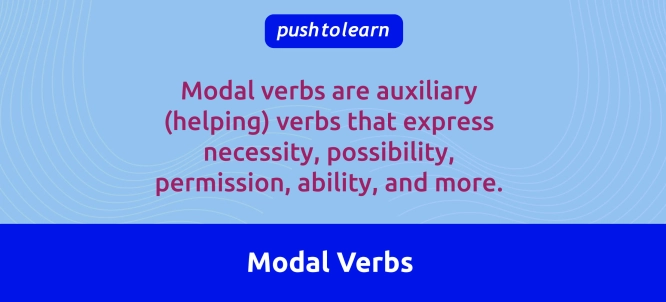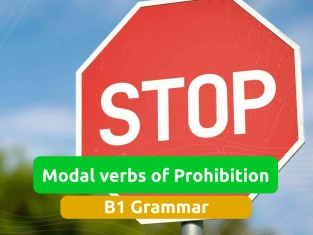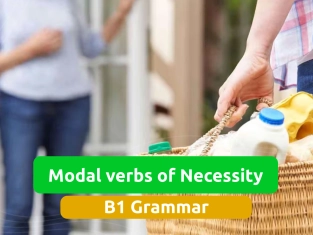by PushtoLearn
Modal Verbs
Table of Contents
Modal Verbs - Exercises
These exercises focus on Modal Verbs
List of Common Modal Verbs
|
Modal Verb |
Uses |
Examples |
|
Can |
Ability, possibility, permission |
"I can swim." / "You can borrow my book." |
|
Could |
Past ability, polite requests, possibility |
"She could run fast." / "Could you help me?" |
|
May |
Permission, possibility |
"You may leave early." / "It may rain." |
|
Might |
Possibility (less certain than "may") |
"We might go to the park later." |
|
Shall |
Suggestions, future intention (formal) |
"Shall we go out?" / "I shall return soon." |
|
Should |
Advice, obligation, expectation |
"You should study for the test." |
|
Will |
Future intention, promises, certainty |
"I will call you tomorrow." |
|
Would |
Politeness, hypothetical situations |
"I would like some tea." / "If I were rich, I would travel." |
|
Must |
Necessity, strong obligation, deduction |
"You must wear a seatbelt." / "He must be tired." |
|
Ought to |
Advice, expectation |
"You ought to apologize." |

Characteristics of Modal Verbs
-
No Infinitive or -ing Forms
Modal verbs don’t take infinitive, past, or participle forms. For example: -
Incorrect: "I canned do it."
-
Correct: "I can do it."
-
Followed by the Base Form
Modals are always followed by the base form of the verb (without "to"). -
Example: "You should study." (Not "should to study")
-
No -s for Third Person Singular
Unlike regular verbs, modals do not add -s in the third person singular. -
Example: "He can swim." (Not "He cans swim")
Uses of Modal Verbs with Examples
-
Ability: "She can play the piano."
-
Permission: "You can use my laptop."
-
Possibility: "It can be very cold in January."
-
Past Ability: "When I was younger, I could run faster."
-
Polite Request: "Could you help me with this?"
-
Possibility: "It could rain later."
-
Permission: "You may take a break now."
-
Possibility: "It may snow tomorrow."
-
Possibility: "We might go to the beach if the weather improves."
-
Shall
-
Suggestions: "Shall we have dinner now?"
-
Formal Intentions: "I shall see to it that your request is fulfilled."
-
Advice: "You should eat more vegetables."
-
Expectation: "He should arrive by 6 p.m."
-
Will
-
Future Intention: "I will call you tomorrow."
-
Promises: "We will never forget this day."
-
Would
-
Politeness: "Would you like some tea?"
-
Hypothetical Situations: "If I were you, I would apologize."
-
Necessity: "You must wear a helmet."
-
Deduction: "He must be the new teacher."
-
Ought to
-
Advice: "You ought to see a doctor."
-
Expectation: "The train ought to arrive soon."
Summary Table
|
Modal Verb |
Main Uses |
Examples |
|
Can |
Ability, Permission, Possibility |
"I can drive." / "You can leave early." |
|
Could |
Past Ability, Polite Requests, Possibility |
"She could swim well." / "Could you help?" |
|
May |
Permission, Possibility |
"You may go." / "It may rain today." |
|
Might |
Possibility |
"It might snow later." |
|
Shall |
Suggestions, Intentions (formal) |
"Shall we go?" / "I shall return." |
|
Should |
Advice, Obligation, Expectation |
"You should try harder." |
|
Will |
Future Intention, Certainty, Promises |
"I will visit you." |
|
Would |
Politeness, Hypotheticals |
"I would love some coffee." |
|
Must |
Necessity, Strong Obligation, Deduction |
"You must leave now." / "He must be tired." |
|
Ought to |
Advice, Expectation |
"You ought to exercise regularly." |
FAQ
Can modal verbs stand alone?
No, modal verbs must always be followed by a main verb in its base form (e.g., "He can swim," not "He can.").
What’s the difference between "may" and "might"?
"May" implies a higher likelihood of something happening, while "might" suggests a lower likelihood. Example:
-
"It may rain" (more certain)
-
"It might rain" (less certain)
Can "shall" be used in informal English?
"Shall" is less common in informal English, especially in American English, where "will" or "should" is often used instead. Example:
-
Formal: "Shall we begin?"
-
Informal: "Should we start?"
What’s the difference between "must" and "have to"?
Both express necessity, but "must" is more formal and is often used for strong obligations or rules. Example:
-
"You must wear a helmet" (a rule).
-
"I have to leave early today" (a personal obligation).
Is "ought to" the same as "should"?
Yes, they are similar and often interchangeable, though "ought to" is less commonly used and sounds more formal.

